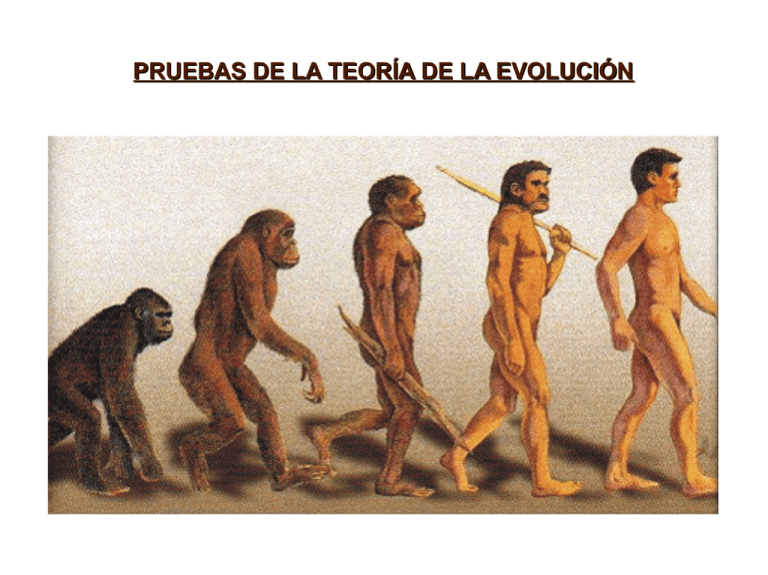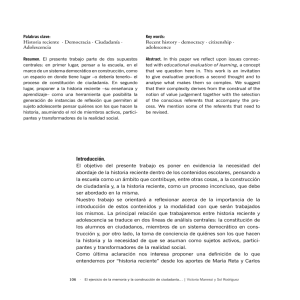PRUEBAS DE LA TEORÍA DE LA EVOLUCIÓN
Anuncio

PRUEBAS DE LA TEORÍA DE LA EVOLUCIÓN ÍNDICE INGLÉS: ESPAÑOL: ● Pág. 4: introducción. ● Pág. 12: introduction. ● Pág.5: evidencias embriológicas. ● Pág. 13: embriologycal evidence. Pág. 6: evidencias procedentes de la anatomía comparada (órganos homólogos) ● ● ● ● ● ● ● Pág.7: evidencias procedentes de la anatomía comparada (órganos vestigiales) Pág. 8: evidencias procedentes de la anatomía comparada (órganos análogos) Pág 9: pruebas procedentes de la paleontología. Pág 10: pruebas biogeográficas. Pág 11: evidencias procedentes de la biología molecular ● ● Pág 14: evidence from the comparative anatomy (homologous structures) Pág. 15: evidence from the comparative anatomy (vestigial organs) Pág. 16: evidence from the comparative anatomy (analogous structures) ● Pág.: 17: evidence from paleontology. ● Pág. 18: biogeographic evidence. ● Pág. 19: evidence from molecular biology. ESPAÑOL INGLÉS Existen gran cantidad de evidencias o pruebas que demuestran que la evolución fue un hecho incuestionable. Estas evidencias provienen de diferentes campos científicos: la embriología, la anatomía comparada, la paleontología, la biogeografía y la biología molecular. PRUEBAS EMBRIOLÓGICAS ● En relación a las pruebas embriológicas, hay que distinguir entre ontogenia, las distintas fases del desarrollo embrionario, y filogenia, concepto que hace referencia a las distintas formas evolutivas por las que han pasado los antecesores de un individuo, es decir, su desarrollo evolutivo. En los vertebrados, cuanto más cerca de la fase inicial se sitúan los embriones, más parecidos son; posteriormente, se van diferenciando progresivamente cuanto más cerca de la fase de adulto terminal se encuentran. PRUEBAS PROCEDENTES DE LA ANATOMÍA COMPARADA ● ● La comparación de la anatomía de muchas especies también nos enseña orígenes comunes de algunas especies. Se entiende por estructuras homólogas aquellas que tienen un origen común pero no cumplen necesariamente una misma función. Como las extremidades anteriores de los mamíferos, que presentan un mismo origen pero que llevan a cabo funciones diversas: locomotora, natatoria... PRUEBAS PROCEDENTES DE LA ANATOMÍA COMPARADA ● ● Un órgano vestigial o rudimentario es un órgano cuya función original se ha perdido durante la evolución. En los seres humanos, varios ejemplos de órganos vestigiales serían las muelas del juicio, el apéndice, el coxis y el músculo piramidal. PRUEBAS PROCEDENTES DE LA ANATOMÍA COMPARADA ● ● Los órganos análogos son las estructuras que pueden cumplir una misión similar pero poseen un origen diferente. De esta manera, las alas de los insectos y las aves serían estructuras análogas. Mientras que las modificaciones que sufrieron las aves se produjeron en sus extremidades anteriores, en el caso de los insectos se trata de expansiones de su su pared corporal. PRUEBAS PROCEDENTES DE LA PALEONTOLOGÍA ● ● ● Un fósil es cualquier evidencia de vida en el pasado. Los diferentes estratos geológicos se pueden reconocer a través de los fósiles que contienen. Casi todos los fósiles encontrados en las capas de rocas más antiguas son muy diferentes de las formas modernas, a las que se van asemejando a medida que se avanza hacia las rocas más jóvenes. Dada la similitud morfológica entre algunas especies fósiles y algunas actuales, se pueden establecer relaciones de parentesco entre ellas. De esta manera los fósiles permiten tener un panorama de los cambios que ocurrieron durante la historia de la vida en la Tierra. PRUEBAS BIOGEOGRÁFICAS ● Existen criaturas similares que comparten más o menos el mismo diseño corporal. Dichas especies afines tienden a encontrase en el mismo continente. Darwin observó que zonas adyacentes de Sudamérica están ocupadas por dos especies parecidas de grandes aves no voladoras y no por avestruces como en África o emúes como en Australia. ● ● “Observamos en estos hechos la existencia de un profundo lazo a través del tiempo y el espacio”, “Este lazo, según mi teoría, es simplemente la herencia.” (Darwin). En otras palabras, las especies parecidas se desarrollan en lugares cercanos porque descienden de ancestros comunes. Como los gliptodontes, estos no dieron origen directamente a los armadillos, es decir no hay una secuencia evolutiva lineal, pero sí ambos tienen un ancestro común. EVIDENCIAS PROCEDENTES DE LA BIOLOGÍA MOLECULAR ● ● El ADN contiene información sobre la historia evolutiva del organismo, debido a que los genes cambian por mutaciones. Dado que la evolución tiene lugar paso a paso, el número de sustituciones en el ADN refleja la duración del período evolutivo correspondiente. Si comparamos dos organismos, como el hombre y el chimpancé, y observamos que el número de diferencias de su ADN es menor que el que hay entre cualquiera de ellos y el orangután, podemos concluir que la divergencia entre estas dos especies es más reciente que entre ellas y el orangután. Es decir, el número de diferencias en las cadenas de ADN o de proteínas es proporcional a la distancia evolutiva existente entre las especies correspondientes. VOLVER ● ● They exist great quality of evidences or tests that demonstrate that the evolution was an unquestionable fact. These evidences come from different scientific fields: the embryology, the compared anatomy, the paleontology, the biogeography and the molecular biology. EMBRIOLOGYCAL EVIDENCE ● In relation to the embryological tests, it is necessary to distinguish between ontogeny, the different phases of the embryonic development, and philogeny, the concept that is refered to the different evolutionary forms for which the predecesoor of an individual have spent, that is to say, his evolutionary development. In the vertebrates, the more near the initial phase the embryos place, the more seemed they are; later, they are differing progressively morenear the phase of terminal adult are. EVIDENCE FROM THE COMPARATIVE ANATOMY ● ● The comparison of the anatomy of many species also teaches us the common origins of some species. There is understood by homologous structures those that they have a common origin but do not fulfill necessarily the same function. As the previous extremities of the mammals, wich present the same origin but wich they carry out diverse functions: locomotive, natatorium... EVIDENCE FROM THE COMPARATIVE ANATOMY ● ● A vestigial or rudimentary organ is an organ which his original function has got lost during the evolution. In the human beings, several examples of vestigial organs would be: the wisdom teeth, the appendix, the coxis and the pyramidal muscle. EVIDENCE FROM THE COMPARATIVE ANATOMY ● ● The analogous organs are the structures that can do a similar mission but they have a different origin. The wings of the insects and the birds would be analogous structures. The diferent is that: the modifications that suffered the birds took place in his previous extremities, in case of the insects it is a question of expansions of his his corporal wall. EVIDENCE FROM PALEONTOLOGY ● ● ● A fossil is any evidence of life in the past. The different geological stages can be recognized across the fossils that they contain. Almost all the fossils found in the most ancient caps of rocks are very different from the modern forms, which they are alike as it is advanced towards the youngest rocks. Given the morphologic similarity between some fossil species and current some, relations of kinship can be established between them. The fossils allow us to have a view of the changes that happened during the history of the life in the Earth. BIOGEOGRAPHIC EVIDENCES ● There are similar creatures that share more or less the same corporal design. The above mentioned related species tend to he was finding in the same continent. Darwin observed that adjacent zones of South America are occupied by two species seemed of big not flying birds and not by ostriches as in Africa or emúes as in Australia. ● ● " We observe in these facts the existence of a deep bow across the time and the space ", " This bow, according to my theory, is simply the inheritance. " (Darwin). In other words, the similar species develop in nearby places because they descend from common ancestors. As the gliptodontes, these they did not give origin directly to the armadillos, that is to say there is no an evolutionary linear sequence, but yes both have a common ancestor. EVIDENCE FROM MOLECULAR BIOLOGY ● ● The DNA contains information about the evolutionary history of an organism, due to the fact that the genes change for mutations. Provided that the evolution takes place stepwise, the number of substitutions in the DNA reflects the duration of the evolutionary corresponding period. If we compare two organisms, as the man and the chimpanzee, and we observe that the number of differences of his DNA is minor that the one that exists between any of them and the orangutan, we can conclude that the difference between these two species is more recent than between them and the orangutan. That is to say, the number of differences in the chains of DNA or of proteins is proportional to the evolutionary existing distance between the corresponding species. VOLVER




